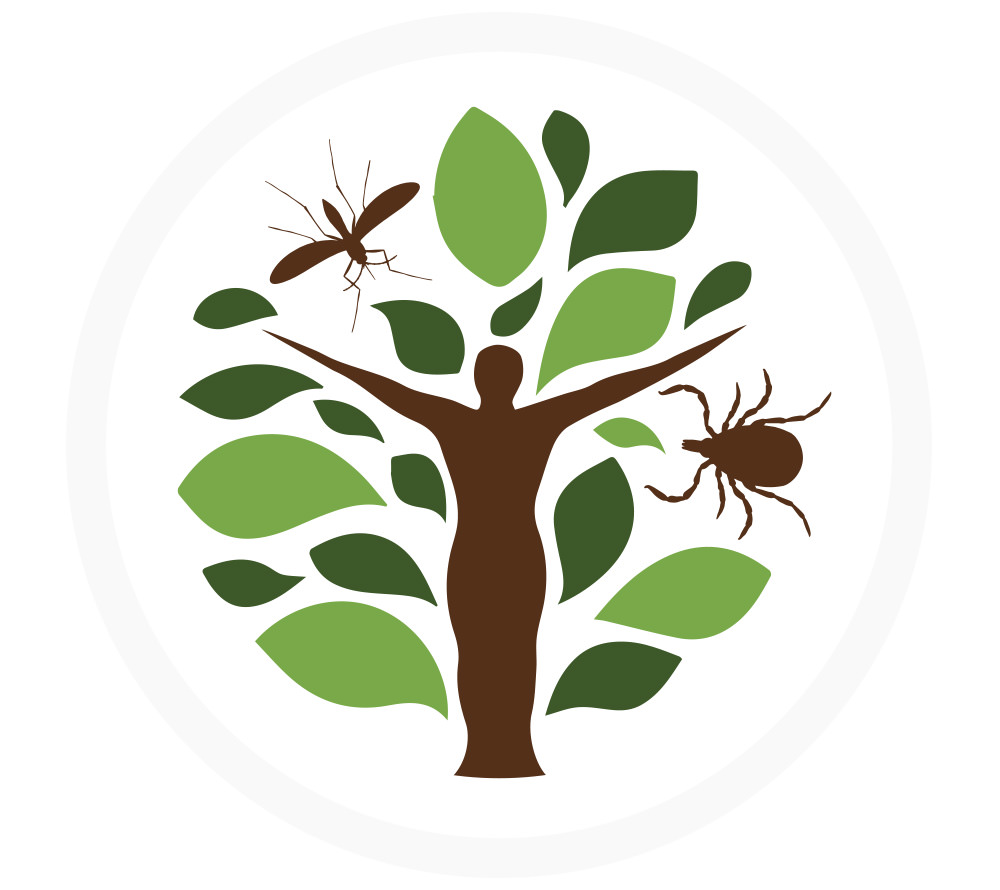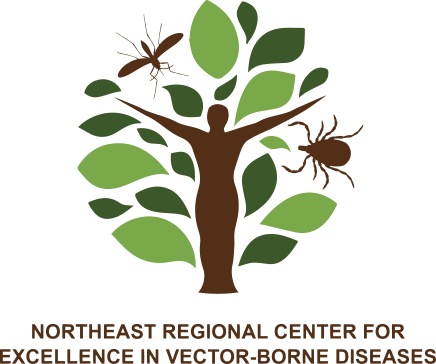Completed Projects NEVBD Applied Research from 2017 - 2022
Explore the applied research agenda supported by NEVBD affiliates and collaborators from 2017 to 2022. You can access publications related to these research projects by visiting our Publications page.
Changing Climate and Disease Risk
Researchers in this area are focused on understanding how a changing climate will affect vector-borne disease risk in the Northeast. Researchers from across our network worked to understand how ticks and mosquitoes will respond to changing temperatures, including surviving Northeast winter conditions and moving into new habitats. Our team explored descriptive and predictive models to understand how changing climates, land use patterns, and species diversity may affect the spread of mosquito- and tick-borne diseases.
Project Team Members:
- Connecticut Agricultural Experiment Station - Philip Armstrong, Andrea Gloria-Soria, Megan Linske, Kirby Stafford, Scott Williams
- Columbia University - Maria Diuk-Wasser, Pallavi Kache, Ángel Muñoz, Laura Plimpton, Meredith VanAcker
- Cornell University - Laura Harrington, Talya Shragai
- Maine Medical Center Research Institute - Charles Lubelczyk
- New York State Department of Health - Alexander Ciota, Alexander ‘Sasha’ Keyel, Maria Onyango
- Rutgers University - Dina Fonseca, Francisco Ferreira, Julia Gonzalez
Monitoring Trends & Predicting Spread
Researchers in this area focused on tracking changes to tick and mosquito abundance, diversity, and distribution across time. Our teams monitored the infection status for multiple pathogens in medically important tick and mosquito vectors. Our studies included information on environmental and ecological conditions that may affect infection and transmission, like temperature and changing climates, and used mathematical models to predict areas at future risk for vector-borne diseases in the Northeast.
Project Team Members:
- Connecticut Agricultural Experiment Station - Philip Armstrong, Douglas Brackney, Andrea Gloria-Soria, Eliza Little, JR McMillan, Goudarz Molaei, John Shepard, Scott Williams
- Columbia University - Maria Diuk-Wasser, Nichar Gregory, Pallavi Kache, Laura Plimpton, Meredith VanAcker
- Cornell University - Laura Harrington, Nicole Foley, Jody Gangloff-Kaufmann, Laura Goodman, Joellen Lampman
- Fordham University - Thomas Daniels, Marly Katz, Vanessa Vinci
- New York State Department of Health - Bryon Backenson, Alexander Ciota, Alan Dupuis, Richard Falco, Alexander ‘Sasha’ Keyel, Nicholas Piedmonte, Melissa Prusinski, Jennifer White
- Rutgers University - Dina Fonseca, Francisco Ferreira, Julia Gonzalez, James Occi, Ilia Rochlin
- SUNY Albany - Oliver Elison Timm, Kathleen McDonough
- University of Pittsburgh - Danielle Tufts
- Virginia Tech - Gillian Eastwood
- Washington State University - Pilar Fernandez
Public Agency Partners:
- New York City Department of Health and Mental Hygiene
- Nassau County, Rockland County, Suffolk County, Westchester County Departments of Health (NY)
- Suffolk County (NY) Vector Control
Vector Competence & Genetic Diversity
Vector competence refers to the ability of arthropods to acquire, maintain, and transmit disease-causing agents to other animals. Researchers working in this area tested the vector competence of mosquito and tick populations in the Northeast for a variety of pathogens important to human health. Our team focused on serious immediate and future threats in our region, including West Nile virus, Eastern equine encephalitis virus, Powassan virus, Zika virus, chikungunya virus, and dengue virus.
Project Team Members:
- Connecticut Agricultural Experiment Station - Philip Armstrong, Douglas Brackney, Andrea Gloria-Soria, Rohit Sharma, John Shepard
- New York State Department of Health - Alexander Ciota, Constentin Dieme, Alan Dupuis, JoAnne Oliver, Maria Onyango, Steven Zink
Public Agency Partners:
- Massachusetts Department of Health
- New Jersey Department of Health
- New Jersey Mosquito Control Commission
Vector Biology, Behavior, and Ecology
Researchers in this area focused on identifying biological and ecological aspects of vector life history in the Northeast. This included information on animal host associations and blood feeding patterns, habitat associations, survival, and fitness. Understanding these key aspects of life history only informed management and control efforts but contributed to our modeling efforts and estimates of risk for vector-borne disease transmission in the Northeast.
Project Team Members:
- Connecticut Agricultural Experiment Station - Philip Armstrong, Megan Linske, Eliza Little, JR McMillan, Goudarz Molaei, Kirby Stafford, Scott Williams
- Columbia University - Maria Diuk-Wasser, Olivia Card, Pallavi Kache, Laura Plimpton, Meredith VanAcker
- Cornell University - Laura Harrington, Antonio Alvarado, Lindsay Baxter, Kara Fikrig, Nicole Foley, Erin Hassett, Jamie Mangan, Elisabeth Martin, Joseph Poggi, Phurchhoki Sherpa
- Fordham University - Thomas Daniels, Marly Katz, Vanessa Vinci
- Maine Medical Center Research Institute - Susan Elias, Charles Lubelczyk, Rebecca Robich, Robert Smith
- New York State Department of Health - Bryon Backenson, Alexander Ciota, Richard Falco, Nicholas Piedmonte, Melissa Prusinski, Jennifer White
- Rutgers University - Dina Fonseca, Matthew Bickerton, Francisco Ferreira, Julia Gonzalez, James Occi, Alvaro Toledo
Public Agency Partners:
- Chesapeake, Norfolk, Virginia Beach Mosquito Control Districts (VA)
- Connecticut Department of Energy and Environmental Protection
- National Park Service
- New Hampshire Department of Health and Human Services
- New Jersey Mosquito Control Commission
- New York City Department of Health and Mental Hygiene
- Pennsylvania Department of Environmental Protection
- Suffolk County (NY) Department of Health, Vector Control
- Tennessee Department of Health
Improving Tools for Surveillance and Control
Effective vector control depends on careful assessment of existing and available control methods, and the detection and management of pesticide resistance. Our team of researchers investigated vector control approaches, mapped pesticide resistance, and evaluated innovative approaches for tick control and pathogen management. Projects in this area also focused on developing or significantly improving traps and field surveillance techniques to target the most important tick and mosquito disease vectors in the Northeast region.
Project Team Members:
- Connecticut Agricultural Experiment Station - Philip Armstrong, Megan Linske, JR McMillan, Kirby Stafford, Scott Williams
- Columbia University - Maria Diuk-Wasser, Olivia Card, Nichar Gregory, Laura Plimpton, Meredith VanAcker
- Cornell University - Laura Harrington, Lindsay Baxter, Elisabeth Martin, Joseph Poggi, Phurchhoki Sherpa
- Fordham University - Thomas Daniels, Marly Katz, Vanessa Vinci
- New York State Department of Health - Nicholas Piedmonte
- Rutgers University - Dina Fonseca, Matthew Bickerton, Julia Gonzalez, Alvaro Toledo
- Suffolk County (NY) Vector Control - Moses Cucura
- Virginia Tech - Gillian Eastwood
Public Agency Partners:
- Connecticut Department of Energy and Environmental Protection
- Massachusetts Mosquito Control - Bristol, Berkshire, Central, Plymouth
- New Jersey Mosquito Control Commission
- New York City Department of Health and Mental Hygiene

